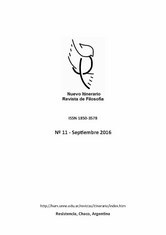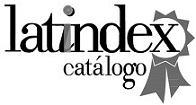Narratives for urgent futures. Feminist keys and relationality facing the Anthropocene-Capitalocene scenario
DOI:
https://doi.org/10.30972/nvt.1916713Keywords:
Feminisms, relationality, Anthropocene, Capitalocene, ChthulucenoAbstract
Starting from the proposal of this thematic issue, which calls for the intertwining of philosophy and feminisms from the present challenges, feminist contributions are made in their power to interrupt the necrotic scene of the Anthropocene, enabling the possibility of other narratives, disobedient to the dominant ones. Responding to the Anthropocene-Capitalocene, as a “limit-event”; that puts at risk the continuity of human and non-human life as we know it, requires a creative exercise that has an inescapable political scope. Such an exercise implies a onto-epistemic shift and an opening to other ways of being and doing. In this shift it is fundamental to think beyond anthropocentric and androcentric paradigms, and to challenge modern dualistic ontology. In this direction, it investigates proposals from feminist thinkers who agree on the political affirmation of relationality, ontological commitment that becomes necessary in view of the scope it has to design living worlds.
Within the debates on the Anthropocene, there are two dimensions to put in dialogue with feminisms: on the one hand, the ontological-political scope of the Anthropocene-Capitalocene and, on the other, the urgency to intervene in the dispute for the future. In relation to the latter the relevance of the concept of refuge is recovered, as key to think a policy of regeneration and recomposition, feminist and relational. Throughout the writing it is argued in order to place the axis of political and epistemic praxis in the reproduction of life, the network of interdependencies and the concomitant care of increasingly precarious threads, as key aspects for the emergence of future others.
In this sense, the article proposes to recover notions of feminist thought, understanding them as urgent narratives that dispute the conventional itineraries of debates on the Anthropocene, since they encourage other metaphors and categories to inhabit in another way the times that we have. In the first place, it ventures into the political affirmation of interdependence and struggles for the common according to the contributions made by Raquel Gutiérrez Aguilar, Lucía Linsalata and Lorena Mina Navarro. Secondly, it is interesting to enter the world of strange kinships, affinities and multispecies alliances promoted by Donna Haraway (2019), to reconfigure ties and open the possibility of building other communities, not post-human, but compost.
Thirdly, in connection with the foregoing, the question arises of the non-anthropocentric care practices and the responsibilities that entails assuming ontological commitments with relationality, together with the contributions of María Puig de la Bellacasa (2017, 2021). Also, by way of synthesis, some premises that they share from the multiple and diverse ecofeminisms are recovered (Herrero, 2017a), to insist on the link between patriarchy and planetary devastation. It is proposed to inscribe relational feminist narratives in a common horizon to imagine and narrate(us) a time and space that is developing beyond the Anthropocene, which Haraway (2019) names as Chthuluceno.
References
Briones, C., J.L. Lanata y A. Monjeau (2019). El futuro del Antropoceno. Utopía y Praxis Latinoamericana, 24 (84), 21-31.
Borsani, M. E. (2020). Humanidad: ¿qué invoca? Otros Logos. Revista de Estudios Críticos, 11 (10), 4-11.
Borsani, M. E. (2021). Cosmopolítica como afrenta al narcisismo occidental. DasQuestões, 8 (2), 3-10.
Costa, F. (2021). Tecnoceno. Algoritmos, biohackers y nuevas formas de vida. Buenos Aires: Taurus.
Crutzen, P. J. y E. F. Stoermer (2000). The ‘Anthropocene’. Global Change Newsletter, (41), 17-18.
Danowski, D, y E. Viveiros de Castro. 2019. ¿Hay mundo por venir? Ensayo sobre los miedos y los fines. Buenos Aires: Caja Negra
De Soto, P. (2017). Indagaciones críticas sobre el Antropoceno. Ecología Política. Cuadernos de Debate Internacional, (53).
Escobar, A. (2014). Sentipensar con la tierra. Nuevas lecturas sobre desarrollo, territorio y diferencia. Medellín: Ediciones UNAULA.
Gutiérrez Aguilar, R., M. N. Sosa e I. Reyes. (2018). El entre mujeres como negación de las formas de interdependencia impuestas por el patriarcado capitalista y colonial. Reflexiones en torno a la violencia y la mediación patriarcal. Momento de paro, tiempo de rebelión. Minerva ediciones. Fundación Rosa Luxemburgo.
Gutiérrez Aguilar, R. y C. López Pardo (2019). Producir lo común para sostener la vida. En: K. Gabbert y M. Lang (eds.) ¿Cómo se sostiene la vida en América Latina? (pp. 387-417). Quito: Edición Fundación Rosa Luxemburg/Ediciones Abya-Yala
Haraway, D. (2019). Seguir con el problema. Bilbao: Consonni.
Haraway, D. et al (2016). Anthropologists are talking–about the Anthropocene. Ethnos, 81(3), 535–564. doi: https://doi.org/10.1080/00141844.2015.1105838.
Herrero, A. (2017a). Ecofeminismos: apuntes sobre la dominación gemela de mujeres y naturaleza. Ecología Política. Cuadernos de Debate Internacional, (54), 18-25.
Herrero, A. (2017b) Navegando por los turbulentos tiempos del Antropoceno. Ecología Política. Cuadernos de Debate Internacional, (53), 20-25.
LaDanta LasCanta (2017). El Faloceno: Redefinir el Antropoceno desde una mirada ecofeminista. Ecología Política. Cuadernos de Debate Internacional, (53), 26-33.
Lander, E. (2019). Crisis civilizatoria. Experiencias de los gobiernos progresistas y debates en la izquierda latinoamericana. Guadalajara: CALAS
Le Guin, Ú. K. (2020). La Teoría de la ficción como Bolsa Transportadora. Cuadernos Materialistas, (5).
Mc Brien, J. (2016). Accumulating Extinction: Planetary Catastrophism in the Necrocene. En J. Moore (ed.), Anthropocene or capitalocene? Nature, history, and the crisis of capitalism (pp. 116-136). Oakland: PM Press.
Monfrinotti Lescura, V. I. (2019). Narrativas otras en tiempos de devastación: la especulación feminista como práctica de resistencia. Revista Barda, 5 (9), 39-49.
Monfrinotti Lescura, V. I. (2020). El Antropoceno/Capitaloceno y sus implicancias ontológico-políticas. Revista Interdisciplinar em Cultura e Sociedade (RICS), 6 (2), 86-101, Jul/dez.
Monfrinotti Lescura, V. I. (2021). El trasfondo ontológico de la modernidad occidental: Revisión crítica de la escisión naturaleza/cultura. En-claves del Pensamiento, 0 (30), 1-26. doi: https://doi.org/10.46530/ecdp.v0i30.422.
Moore, J. W. (2020). El Capitalismo en la Trama de la Vida. Ecología y Acumulación de Capital. Traficantes de Sueños.
Navarro Trujillo, L. M. y R. Gutiérrez Aguilar. (2018). Claves para pensar la interdependencia desde la ecología y los feminismos. Bajo el Volcán, 18 (28), 45-57.
Navarro Trujillo, M. L. y L. Linsalata. (2021). Capitaloceno, luchas por lo común y disputas por otros términos de interdependencia en el tejido de la vida. Reflexiones desde América Latina. Revista Relaciones Internacionales,(46), 81-98.
Peredo Beltrán, E. (2019). Antropoceno y Biopolítica: Narrativas, resistencias y nuevas epistemologías ante el avance de la frontera extractivista en la Bolivia del Siglo XXI. Utopía y Praxis Latinoamericana, 24 (84), 56-67.
Pérez Orozco, A. (2014). Subversión feminista de la economía. Aportes para un debate sobre el conflicto capital-vida. Traficantes de sueños.
Puig de la Bellacasa, M. (2017). Matters of Care. Speculative Ethics in More than Human Worlds. Minneapolis: University of Minnesota Press.
Puig de la Bellacasa, M. (2017). Pensar con cuidado. Revista Concreta, (9), 26-47.
Puig de la Bellacasa, M. (2021). Reanimar los suelos: transformando los afectos entre humanos y suelos a través de la ciencia, la cultura y la comunidad. Otros Logos. Revista de Estudios Críticos., 11 (12), 42-74.
Bonneuil, C. (2015). Tous responsables?. Le Monde diplomatique. Recuperado de: https://mondiplo.com/somos-todos-responsables.
Trischler, H. (2017). El Antropoceno, ¿un concepto geológico o cultural, o ambos?. Desacatos, (54), 40-57.
Ulloa, A. 2017. Dinámicas ambientales y extractivas en el siglo XXI: ¿es la época del Antropoceno o del Capitaloceno en Latinoamérica? Desacatos, (54), 58-73.
Downloads
Published
How to Cite
Issue
Section
License
Les autores ceden a Nuevo Itinerario los derechos de publicidad de sus trabajos, toda vez que hayan sido admitidos como parte de alguno de sus números. Ello no obstante, les autores retienen los derechos de propiedad intelectual y responsabilidad ética así como la posibilidad de dar difusión propia por los medios que consideren.












51.jpg)

